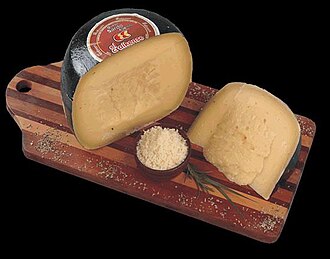Argentine cheese
Argentine Cheese
Argentine cheese is a diverse and rich component of the country's culinary heritage, reflecting a blend of European influences and local traditions. Argentina is one of the largest producers of cheese in Latin America, with a wide variety of cheeses that are integral to its cuisine.
History
The history of cheese in Argentina dates back to the arrival of European immigrants in the late 19th and early 20th centuries. These immigrants, particularly from Italy and Spain, brought with them cheese-making techniques and traditions that have since been adapted to local conditions. The fertile Pampas region, with its vast pastures, provided an ideal environment for dairy farming, leading to the development of a robust cheese industry.
Types of Argentine Cheese
Argentina produces a wide range of cheeses, each with unique characteristics and uses. Some of the most popular types include:
Reggianito
Reggianito is a hard, granular cheese similar to Parmigiano-Reggiano. It was developed by Italian immigrants who sought to replicate the flavors of their homeland. Reggianito is aged for several months, resulting in a sharp, nutty flavor. It is commonly used grated over pasta dishes or as a table cheese.
Sardo
Sardo is another hard cheese, originally inspired by the Italian Pecorino Sardo. It is made from cow's milk and is known for its firm texture and strong, tangy flavor. Sardo is often used in cooking or served as an appetizer with olives and cured meats.
Cremoso
Cremoso is a soft, creamy cheese that is similar to Mozzarella or Brie. It is made from whole cow's milk and has a mild, buttery taste. Cremoso is often used in sandwiches, salads, and as a topping for pizzas.
Queso Goya
Queso Goya is a semi-hard cheese with a smooth texture and a mild flavor. It is versatile and can be used in a variety of dishes, from melting over grilled meats to being served as a snack with bread and wine.
Cheese Production
The production of cheese in Argentina is concentrated in the provinces of Buenos Aires, Santa Fe, and Córdoba. These regions have a long tradition of dairy farming and are home to many artisanal and industrial cheese producers. The cheese-making process in Argentina often involves traditional methods, with an emphasis on quality and flavor.
Culinary Uses
Cheese is an essential ingredient in many Argentine dishes. It is used in empanadas, milanesas, and pizza, as well as in traditional dishes like provoleta, a grilled cheese dish often served as an appetizer. Argentine cheese is also enjoyed on its own, paired with wine or mate.
Related Pages
Transform your life with W8MD's budget GLP-1 injections from $125.
W8MD offers a medical weight loss program to lose weight in Philadelphia. Our physician-supervised medical weight loss provides:
- Most insurances accepted or discounted self-pay rates. We will obtain insurance prior authorizations if needed.
- Generic GLP1 weight loss injections from $125 for the starting dose.
- Also offer prescription weight loss medications including Phentermine, Qsymia, Diethylpropion, Contrave etc.
NYC weight loss doctor appointments
Start your NYC weight loss journey today at our NYC medical weight loss and Philadelphia medical weight loss clinics.
- Call 718-946-5500 to lose weight in NYC or for medical weight loss in Philadelphia 215-676-2334.
- Tags:NYC medical weight loss, Philadelphia lose weight Zepbound NYC, Budget GLP1 weight loss injections, Wegovy Philadelphia, Wegovy NYC, Philadelphia medical weight loss, Brookly weight loss and Wegovy NYC
|
WikiMD's Wellness Encyclopedia |
| Let Food Be Thy Medicine Medicine Thy Food - Hippocrates |
Medical Disclaimer: WikiMD is not a substitute for professional medical advice. The information on WikiMD is provided as an information resource only, may be incorrect, outdated or misleading, and is not to be used or relied on for any diagnostic or treatment purposes. Please consult your health care provider before making any healthcare decisions or for guidance about a specific medical condition. WikiMD expressly disclaims responsibility, and shall have no liability, for any damages, loss, injury, or liability whatsoever suffered as a result of your reliance on the information contained in this site. By visiting this site you agree to the foregoing terms and conditions, which may from time to time be changed or supplemented by WikiMD. If you do not agree to the foregoing terms and conditions, you should not enter or use this site. See full disclaimer.
Credits:Most images are courtesy of Wikimedia commons, and templates, categories Wikipedia, licensed under CC BY SA or similar.
Contributors: Prab R. Tumpati, MD




